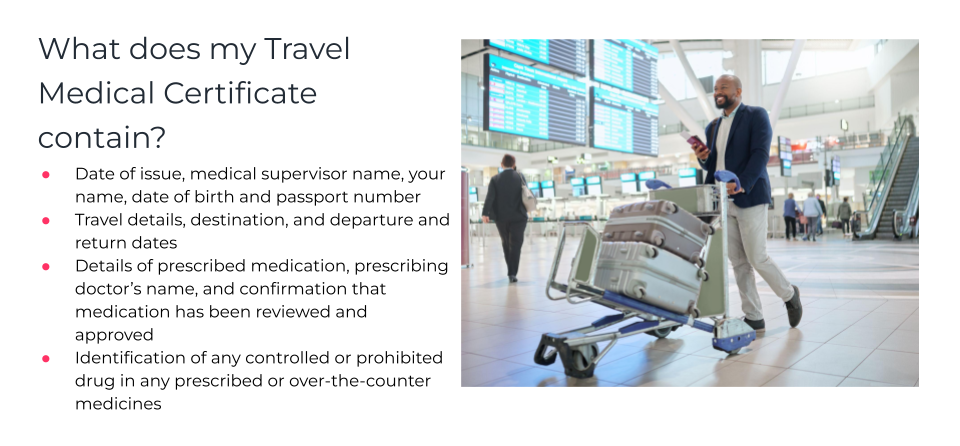As the holiday season approaches, many people are planning their winter getaways, dreaming of snow-capped mountains, balmy beaches or vibrant cityscapes. Amidst the excitement of planning your next adventure, it’s crucial to consider the medication restrictions at your chosen destination. Whether you’re spending Christmas skiing the Italian and Swiss Alps or indulging in the thrill of spending the new year in Dubai, familiarising yourself with the local regulations is essential to ensure a smooth and enjoyable trip.
In this guide, we’ll look at medication restrictions in some popular holiday destinations and highlight cases where people have got into trouble for not following these restrictions so that you don’t make the same mistakes. We’ll also advise on how to ensure you’re compliant with the rules and how to use DocHQ’s Travel Medicine Checker and Travel Medicine Certificate services to make your travel journey stress-free.
Dubai
The UAE is a popular new year’s destination for British travellers. It’s important to note that the UAE has strict regulations on controlled substances. Travellers should carefully check the list of prohibited medications and ensure they have the necessary documentation, such as a doctor’s letter, to avoid any legal repercussions.
Restricted medications in the UAE
- Strong painkillers containing codeine, valium or Ritalin
- Common contraceptive pills
- Some nicotine lozenges, such as Niquitin Mint Lozenges
- Otrivin Nasal Spray
- Some sleeping and anti-anxiety pills
- HIV/AIDS antiretroviral medication for personal use
Europe
Planning a Christmas escape to Europe? Be mindful of the different restrictions in various countries, especially for narcotics. In Greece, Italy and Switzerland, a copy of a prescription letter signed by a doctor is required for entry. DocHQ’s Free Travel Medicine Checker tool can be used to check the regulations of your chosen European destination and ensure your medications are compliant. You can also obtain a supporting letter from a doctor easily using DocHQ’s travel medicine certificate service.
Commonly restricted medicines across Europe
- ADHD/ADD medications (Adderall, Concerta, Ritalin)
- Pain medications (Vicodin, Oxycontin, Demerol)
- Anxiety medications (Xanax, Ativan, Valium)
US
While the United States permits a wide range of medications, certain substances containing potentially addictive components require proper documentation. DocHQ’s Travel Medicine Certificate service is designed to assist travellers with the necessary documentation, including a Travel Guidance Letter outlining destination-specific restrictions and how to obtain additional required documents
Restricted medications in the US
- Medicines containing potentially addictive substances or narcotics (antidepressants, sleeping pills) without a doctor’s note
Japan
Japan has strict regulations on some popular over-the-counter medications. Decongestants containing pseudoephedrine, such as Vicks, Zyrtec, Advil and Tylenol, are strictly prohibited.
Additionally, travellers are only allowed a maximum three-month supply of controlled medications. See the case of Carrie Russell, who was detained in Japan for 18 days for ADHD medication.
Restricted medications in Japan
- Decongestants containing pseudoephedrine, such as Vicks, Zyrtec, Advil and Tylenol
- Adderall and other amphetamines/methamphetamines
- ADHD drugs like Adderall, Vyvanse and Dexedrine
- Medications containing codeine or morphine
- CBD oil
Restrictions from other countries
Qatar: Qatar regulates over-the-counter medicines such as cold and cough remedies, requiring travellers to carry a doctor’s note for compliance.
Thailand: Codeine and other popular drugs used to treat ADHD are restricted in Thailand.
Singapore: Anxiety medication, sleeping pills, strong painkillers, and even common medications used to treat high cholesterol and diabetes are restricted and require a doctor’s note.
Indonesia: Many prescription medicines, such as codeine, sleeping pills and treatments for ADHD, are illegal.
Hong Kong: Sleeping tablets and medication to treat anxiety and medications used in treating certain conditions, such as erectile dysfunction, are banned without a doctor’s note. If you intend to take sleeping tablets during your flight you are advised to carry a doctor’s note.
Saudi Arabia and Nigeria: Ambien, a widely used prescription sleep aid, is prohibited in both Saudi Arabia and Nigeria.
General guidance for travelling with medication

- Medications should be in their original packaging and containers.
- Avoid travelling with more than a 90-day supply unless necessary.
- Plan ahead and request a Travel Medicine Certificate at least 6 weeks before travelling.
- Declare all drugs and medicinal products to the appropriate officials.
- Carry a prescription or a written statement from your GP stating the necessity of the substances for your physical wellbeing during travel.
Concerned about medication restrictions during your travels? Use DocHQ’s free Travel Medicine Checker to ensure your medicines are safe for your destination. If needed, opt for our Travel Medicine Certificate service. Our GPs review your prescriptions and provide necessary documents, including a Travel Guidance Letter outlining destination-specific restrictions and how to obtain additional required documents. Travel confidently with DocHQ.



